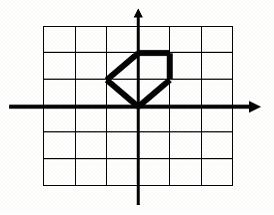poj 1654 Area(计算几何)
2013-08-11 08:50
330 查看
Area
Description
You are going to compute the area of a special kind of polygon. One vertex of the polygon is the origin of the orthogonal coordinate system. From this vertex, you may go step by step to the following vertexes of the polygon until back to the initial vertex.
For each step you may go North, West, South or East with step length of 1 unit, or go Northwest, Northeast, Southwest or Southeast with step length of square root of 2.
For example, this is a legal polygon to be computed and its area is 2.5:

Input
The first line of input is an integer t (1 <= t <= 20), the number of the test polygons. Each of the following lines contains a string composed of digits 1-9 describing how the polygon is formed by walking from the origin. Here 8, 2, 6 and 4 represent North,
South, East and West, while 9, 7, 3 and 1 denote Northeast, Northwest, Southeast and Southwest respectively. Number 5 only appears at the end of the sequence indicating the stop of walking. You may assume that the input polygon is valid which means that the
endpoint is always the start point and the sides of the polygon are not cross to each other.Each line may contain up to 1000000 digits.
Output
For each polygon, print its area on a single line.
Sample Input
Sample Output
Source
POJ Monthly--2004.05.15 Liu Rujia@POJ
题意:求任意多边形面积
题解:用叉积逐个三角形求解就可以了,由于旋转方向不一定,所以面积有可能为负数,不过全部的三角形的旋转方向是一样的,所以不用担心有抵消的面积
| Time Limit: 1000MS | Memory Limit: 10000K | |
| Total Submissions: 12974 | Accepted: 3682 |
You are going to compute the area of a special kind of polygon. One vertex of the polygon is the origin of the orthogonal coordinate system. From this vertex, you may go step by step to the following vertexes of the polygon until back to the initial vertex.
For each step you may go North, West, South or East with step length of 1 unit, or go Northwest, Northeast, Southwest or Southeast with step length of square root of 2.
For example, this is a legal polygon to be computed and its area is 2.5:

Input
The first line of input is an integer t (1 <= t <= 20), the number of the test polygons. Each of the following lines contains a string composed of digits 1-9 describing how the polygon is formed by walking from the origin. Here 8, 2, 6 and 4 represent North,
South, East and West, while 9, 7, 3 and 1 denote Northeast, Northwest, Southeast and Southwest respectively. Number 5 only appears at the end of the sequence indicating the stop of walking. You may assume that the input polygon is valid which means that the
endpoint is always the start point and the sides of the polygon are not cross to each other.Each line may contain up to 1000000 digits.
Output
For each polygon, print its area on a single line.
Sample Input
4 5 825 6725 6244865
Sample Output
0 0 0.5 2
Source
POJ Monthly--2004.05.15 Liu Rujia@POJ
题意:求任意多边形面积
题解:用叉积逐个三角形求解就可以了,由于旋转方向不一定,所以面积有可能为负数,不过全部的三角形的旋转方向是一样的,所以不用担心有抵消的面积
#include<stdio.h>
#include<string.h>
struct point{
int x,y;
}p[1000010];
char s[1000010];
int way[9][2]={{1,-1},{1,0},{1,1},{0,-1},{0,0},{0,1},{-1,-1},{-1,0},{-1,1}};
long long mult(struct point p1,struct point p2,struct point p3)
{
return (long long)(p2.x-p1.x)*(p3.y-p1.y)-(long long)(p3.x-p1.x)*(p2.y-p1.y);
}
int main()
{
int t,i,temp,len;
long long res;
scanf("%d",&t);
while(scanf("%s",s)>0)
{
len=strlen(s);
res=p[0].x=p[0].y=0;
for(i=1;i<=len;i++)
{
temp=s[i-1]-'1';
p[i].x=p[i-1].x+way[temp][0];
p[i].y=p[i-1].y+way[temp][1];
}
for(i=1;i<=len;i++)
res+=mult(p[0],p[i],p[i+1]);
if(res<0) res=-res;
if(res&1) printf("%I64d.5\n",res/2);
else printf("%I64d\n",res/2);
}
return 0;
}
相关文章推荐
- poj 1654 Area ----- 计算几何
- POJ 1654 Area(计算几何)
- poj1654 Area (计算几何)
- POJ 1654 Area 计算几何基础
- POJ 1654 Area 【叉乘+外积的几何意义】【计算几何】
- Area poj 1654 计算几何
- [POJ1654]Area(计算几何-多边形的面积)
- poj1654 Area 计算几何
- [POJ1654]Area(计算几何)
- 计算几何--POJ--1654--Area
- POJ 1654 Area(计算几何)
- 【计算几何】poj 1654 Area
- poj1654—Area(计算几何求多边形面积)
- (计算几何POJ step 8.1.1.2)POJ 1654 Area(使用叉积来计算多边形面积)
- POJ 1654 Area计算几何(解题报告)
- POJ 1654 Area 计算几何
- POJ 1654 Area (计算多边形面积)
- POJ 1265-Area(计算几何+皮克定理+多边形面积公式)
- POJ 1654 Area(叉积计算多边形面积)
- POJ 1265 Area(计算几何Pick定理)
